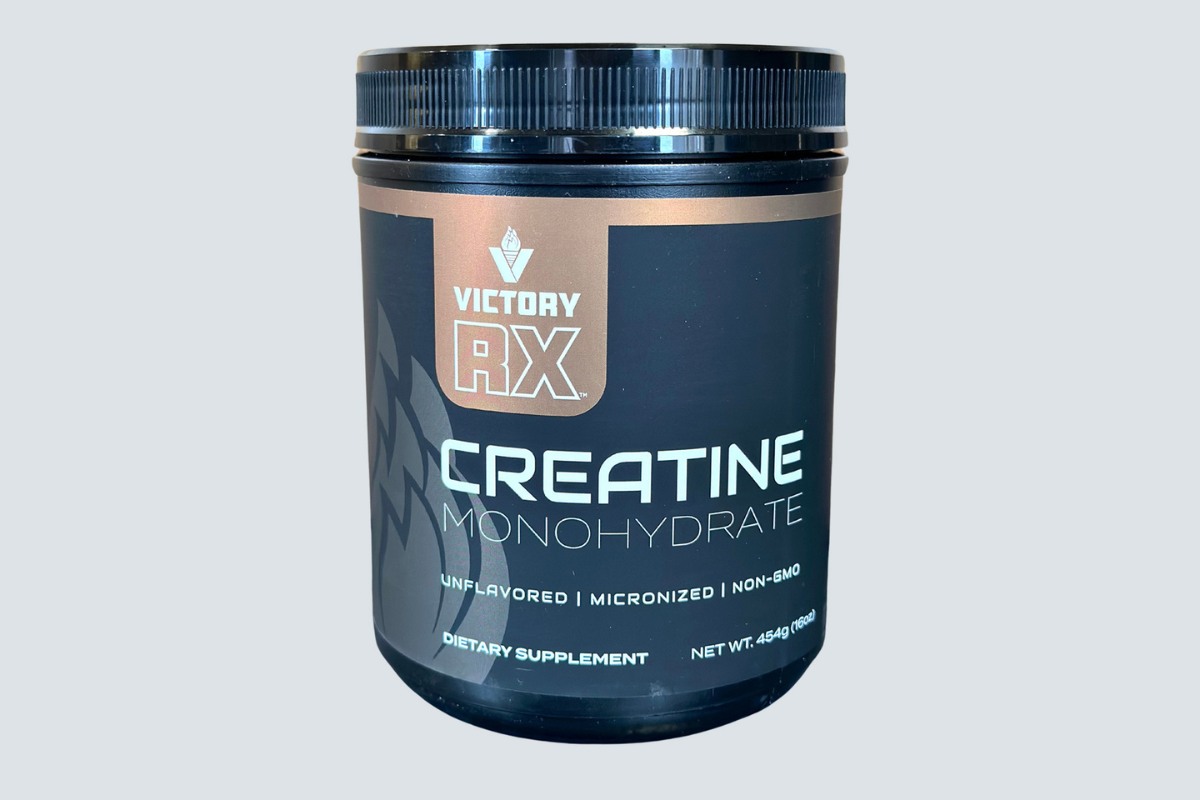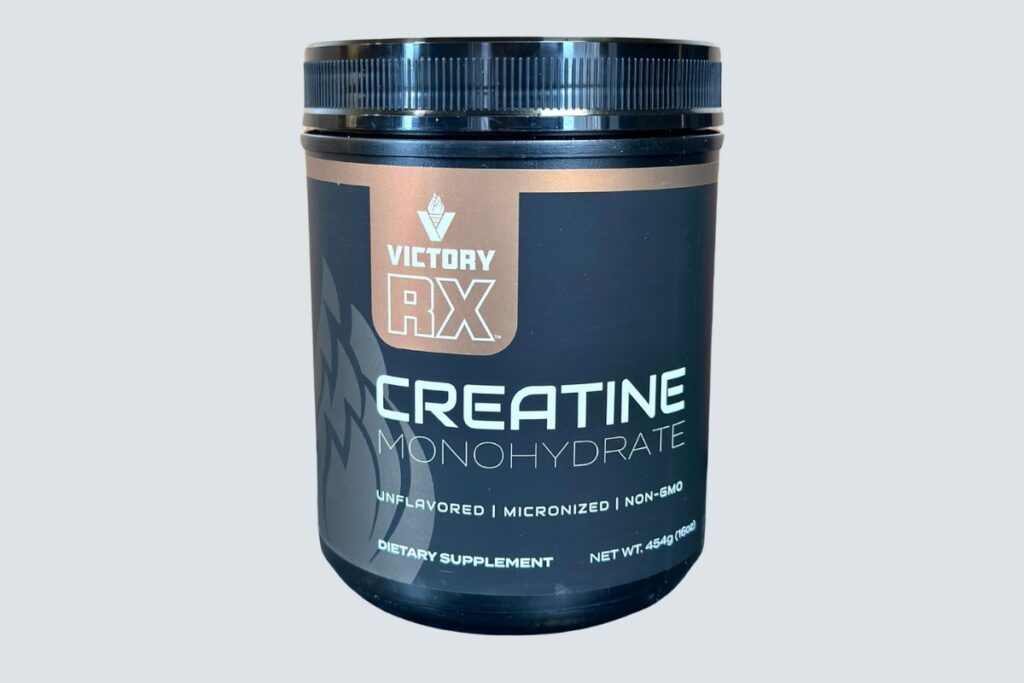Is Creatine Bad For You?
category: Health Optimization

For decades, creatine has been one of the most popular supplements for athletes. But in recent years, it’s become more common in the fitness and health world – even among casual gym-goers. With its rising popularity, we’ve been getting more questions about the supplement, like: “Is creatine bad for you?”
Our CEO Amy Stuttle is a huge fan of her daily creatine supplement (yes, it’s for women, too!) and the benefits it gives her. In a recent episode of the Women Want Strong Men podcast, she discussed the many benefits of creatine with Dr. Darren Candow, a leading expert on the subject. Check out the full episode below, then keep reading for more.
However, before making any changes to your supplement regimen, it’s important to have all the facts. That’s why we’re revealing the benefits and side effects of creatine, who should take it, and whether it’s worth it. We’ll even tell you whether it affects your testosterone levels. Let’s get started.
Yes or No: Is Creatine Bad For You?
The short answer: No, creatine is not bad for you.
In fact, it’s one of the most well-researched supplements out there, with ample studies backing its safety and effectiveness. Creatine is a naturally occurring compound found in your muscles and brain, and supplementing with it is safe for most people when taken in the proper doses.
However, choosing a high-quality supplement is crucial to maximize its benefits and avoid unnecessary fillers or contaminants that can compromise both effectiveness and safety. We only source premium ingredients for our supplements, including our Creatine Monohydrate, to ensure you’re getting the best possible support for your strength, performance, and overall wellness.
Amy is a huge fan of creatine monohydrate for its superior safety and efficacy compared to other less-established alternatives. By choosing monohydrate over other types of creatine, you’re getting a science-backed product for optimal results.
As with any supplement, it’s important to be mindful of how much you’re taking and whether it’s the right choice for your body and goals. If you’re curious about starting, chat with your healthcare provider or book a consultation with one of our men’s health experts to find out if it’s a good fit for you.
What Are the Benefits of Creatine?

When it comes to supplements, creatine is often considered the gold standard for those looking to enhance their physical performance and muscle growth. But as Amy often points out, the benefits extend beyond just physical advantages—it can also support your mental performance.
Whether you’re looking to enhance your fitness game or want to boost your energy levels and brain health, this supplement can make a noticeable difference. Let’s break down some of the top benefits of creatine:
- Increased Muscle Strength
- Improved Muscle Recovery
- Enhanced Muscle Mass
- Bone Density Support
- Boosted Performance
- Cognitive Support
Increased Muscle Strength
Creatine is known for enhancing strength, particularly during high-intensity activities like weightlifting and sprinting. By boosting the availability of ATP (the energy currency of your cells), it helps you perform more reps, lift heavier weights, and improve your overall power output.
Improved Muscle Recovery
After a tough workout, your muscles need time to recover. Creatine helps by reducing muscle cell damage and inflammation, speeding up the recovery process. This means you can get back in the gym faster and with less soreness—it’s a win-win!
Enhanced Muscle Mass
One of the most sought-after benefits of creatine is its ability to promote muscle growth. By increasing water content in your muscle cells and boosting the overall volume of your muscles, creatine helps you appear fuller and gain lean muscle mass over time.
Bone Density Support
Creatine doesn’t just benefit your muscles—it also plays a role in supporting bone density. By enhancing cellular energy and aiding in muscle contractions, it indirectly helps maintain the strength and resilience of your bones, especially during weight-bearing activities.
This added support can be a valuable benefit for long-term bone health, helping to keep you strong and active as you age.
Boosted Performance in High-Intensity Exercise
If you engage in short bursts of high-intensity activity, creatine can give you an edge. From sprinting to powerlifting, creatine supports rapid energy production, improving performance in activities that require explosive movements.
Cognitive Support
Did you know that creatine isn’t just for your muscles? It also benefits your brain by improving cognitive function, especially during tasks that require quick thinking or mental endurance.
Studies suggest that creatine may help reduce mental fatigue and improve memory, making it a well-rounded supplement for both physical and mental performance.
What Are the Side Effects of Creatine?
It’s natural to wonder about the potential downsides. After all, no one wants to deal with unexpected side effects. The good news? Creatine is generally safe for most people when used appropriately. It’s one of the most studied supplements on the market, and serious side effects are rare.
That being said, it’s still important to know how creatine might affect your body, especially if you’re new to taking it. Some people experience mild side effects, but these are typically easy to manage with a little preparation and proper hydration.
The most common side effects include:
- Water retention – Creatine draws water into your muscle cells, which can lead to temporary bloating or weight gain.
- Stomach discomfort – Some people may experience digestive issues, such as nausea or cramping, if they take creatine without drinking enough water.
- Muscle cramping – Dehydration while taking creatine can lead to muscle cramps, so it’s important to drink plenty of water throughout the day.
- Kidney concerns – While creatine is safe for those with healthy kidneys, anyone with pre-existing kidney conditions should consult their healthcare provider before starting supplementation.
Who Should Take Creatine?
If you’re looking to boost your performance, increase muscle mass, or improve workout recovery, creatine is a great choice. It’s especially beneficial for athletes, weightlifters, bodybuilders, and anyone engaged in high-intensity exercise.
Who shouldn’t take creatine? Creatine may not be ideal for those with existing kidney issues, as it can put additional strain on the kidneys. It’s also worth noting that if you’re not regularly engaging in routine exercise, you might not see as much of the physical benefits of creatine.
Does Creatine Increase Testosterone?
No, creatine does not increase testosterone levels.
While creatine offers plenty of performance benefits, it doesn’t directly affect testosterone production. If you’re struggling with low testosterone, creatine won’t be a solution for that. However, we offer Testosterone Replacement Therapy (TRT) for men looking to improve their testosterone levels.
We administer TRT in several forms, including:
- Injections – Delivered directly into the muscle, injections offer a fast-acting option for boosting testosterone levels.
- Creams – A more convenient and steady-release option, testosterone creams are applied to the skin daily on an area of the body as instructed by your healthcare provider.
- Pellets – These small implants are placed under the skin in the buttock area and provide a slow, steady release of testosterone over 4-6 months.
Each method has its pros and cons, and the right choice depends on your lifestyle, goals, and preferences. If you’re dealing with low testosterone levels, our experts at Victory Men’s Health can help determine the best TRT option for you.
Is It Worth Taking Creatine?
Yes! Creatine is more than just a performance enhancer for athletes—it’s a well-rounded supplement that offers benefits beyond the gym. Amy and the rest of our team are strong advocates for incorporating creatine into your daily regimen.
Whether you’re looking to increase muscle mass, boost your strength, speed up recovery, enhance mental clarity, or reduce fatigue, creatine can deliver results. As a valuable tool for both the mind and body, creatine could be a solid addition to your supplement routine.
As a reminder, we recommend consulting with your healthcare provider before adding any new supplements to your regimen to ensure that it’s the right move for your specific needs and goals.
Optimize Your Well-Being with Victory Men’s Health
We believe in taking a comprehensive approach to your health with a personalized treatment plan tailored to your lifestyle and needs. Whether you’re looking to enhance your performance with supplements like creatine or address other health concerns like low testosterone and erectile dysfunction, our team is here to help.
We have four clinics in Missouri and Illinois, and we also offer telehealth services for patients who aren’t able to come see us in person. Ready to take action?
Contact us today to schedule a consultation and take the first step toward improving your health, fitness, and overall well-being.